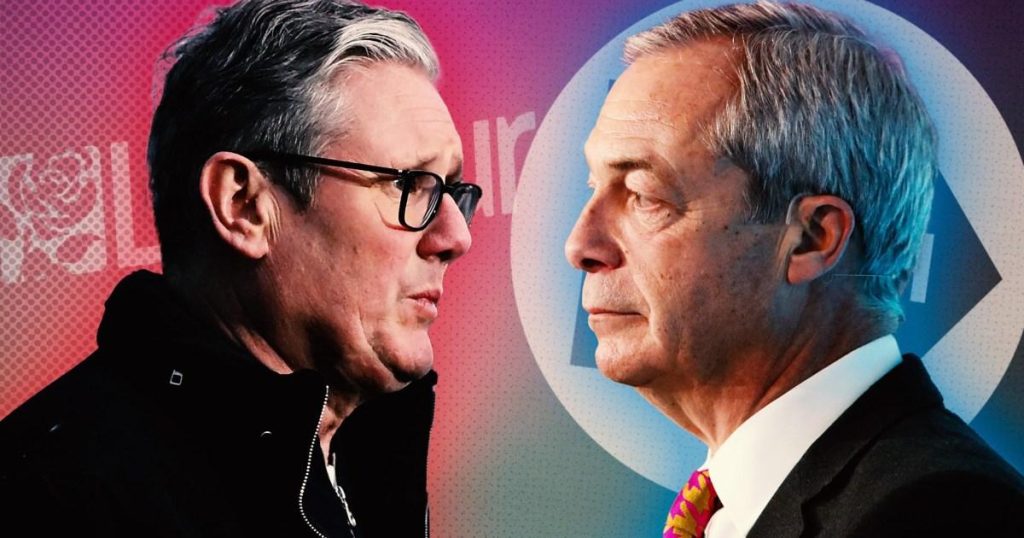A Shifting Political Landscape: Post-Election Poll Reveals Surprising Trends
A recent YouGov poll, the first since the last general election, paints a complex picture of the UK’s evolving political landscape. While Labour maintains a nominal lead, suggesting a potential victory in a hypothetical immediate election, their margin is razor-thin, and the source of their greatest challenge comes not from the Conservatives, but from the surging Reform UK party. This unexpected development signals a potential realignment of voter preferences, with Reform UK trailing Labour by a mere 1%, a stark contrast to the substantial lead Labour enjoyed in the previous election. This tight race raises questions about the stability of the current political order and the potential for significant shifts in power dynamics in the near future.
The Conservatives, traditionally Labour’s main rivals, find themselves in a weakened position, with a significant portion of their previous supporters now favoring Reform UK. This 15% shift underscores the challenges facing the Tory leadership as they navigate a changing political climate and attempt to regain lost ground. The poll also reveals a fragmentation of Labour’s support base, with voters migrating to a variety of other parties, including the Conservatives, Reform UK, the Green Party, and the Liberal Democrats. This dispersal of support suggests a degree of voter dissatisfaction with Labour and a willingness to explore alternative political options.
While the poll’s headline figures might suggest a close contest between Labour and Reform UK, the complexities of the UK’s "first past the post" electoral system necessitate a deeper analysis. Vote share does not directly translate into parliamentary seats, as demonstrated by the previous election results where Reform UK secured a substantial percentage of the vote but only a handful of seats. Conversely, the Liberal Democrats, with a smaller vote share, garnered a significant number of seats. This discrepancy highlights the importance of strategic voter concentration and the inherent advantages enjoyed by established parties with strong regional bases. Reform UK’s success will depend on their ability to translate their growing support into tangible electoral gains by strategically targeting key constituencies and overcoming the inherent challenges posed by the electoral system.
Furthermore, the poll sheds light on the demographic distribution of voter preferences, revealing stark generational divides. Labour enjoys a commanding lead among younger voters, particularly those aged 18-24, while the Conservatives hold sway among older demographics, especially those aged 65+. This generational split reflects differing priorities and concerns, with younger voters potentially more drawn to Labour’s progressive agenda, while older voters may favor the Conservatives’ more traditional stance. This age gap presents a challenge for both parties as they strive to broaden their appeal across different demographics.
The Conservatives’ diminished support since the last election can be attributed to a series of controversies and policy decisions, including cuts to social programs and perceived missteps in handling key issues. These controversies have eroded public trust and fueled calls for another general election, as evidenced by a petition garnering millions of signatures. The government faces the difficult task of regaining public confidence and demonstrating its responsiveness to the concerns of its electorate. The poll suggests a significant portion of Labour voters are undecided, indicating a potential opportunity for the Conservatives to reclaim lost ground by effectively addressing voter concerns and fulfilling their manifesto promises.
The evolving political landscape presents both opportunities and challenges for all parties. Labour, while maintaining a lead, must consolidate its support and address the fragmentation of its voter base. The Conservatives need to regain lost ground and win back disillusioned voters. Reform UK, riding a wave of newfound support, faces the challenge of translating its popularity into tangible electoral gains within the constraints of the "first past the post" system. The future of British politics remains uncertain, with the next election potentially yielding significant shifts in power and a realignment of the political spectrum. The poll serves as a snapshot of the current dynamic, but the ongoing evolution of voter preferences and the unpredictable nature of political events will ultimately determine the outcome of the next election.


